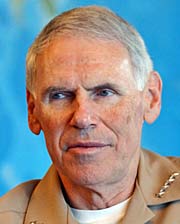Pacific admiral seeks
ties with China
Commander Fallon hopes
to build on what he believes
are common goals
CAMP H.M. SMITH, Hawaii » The commander of U.S. forces in the Pacific says that Americans face "significant challenges" in dealing with China because of issues like the Taiwan Strait, but Adm. William J. Fallon hopes to deepen bilateral understanding by boosting defense ties.
![]()

![]()
William J. Fallon: He wants the issue over Taiwan resolved peacefully
Fallon, who oversees territory stretching from the U.S. West Coast to the Indian Ocean, said the complexities and challenges faced by the region require the two nations to cooperate.
"There is ample ground for common work in many areas," Fallon told the Associated Press in an interview at Camp H.M. Smith last week. "I'd like to explore areas in which we can move forward in a useful manner."
He said the countries have common interests, ranging from prodding North Korea to get rid of its nuclear weapons to ensuring the safe passage of trade through the pirate-infested Malacca Straits in Southeast Asia.
The need for an international response to natural disasters like the Dec. 26 tsunami in the Indian Ocean added to the reasons the countries should work together, he said.
Fallon hopes to visit China, perhaps sometime this year, and build relationships with his Chinese counterparts. Chinese officials and the U.S. Embassy in Beijing were working out dates and details for a trip, said Fallon, who took over the command in February.
Personal interaction is key, he said.
"It's been my experience that unless we get to know people, we tend to view them through the lens of suspicion, of ignorance. We begin to rely upon secondhand opinions and rumors rather than our own firsthand experiences," Fallon said.
If Washington approves, Fallon said, he hopes to build on the military ties between the two nations, which now are limited to a small number of port visits and the exchange of senior-level personnel.
China's military -- the world's largest when measured by troop size -- has come under increasing scrutiny as Beijing has sharply boosted defense spending in recent years.
China has spent heavily to upgrade its outdated weapons technology and improve training, citing the need to face down threats from an independence-minded Taiwan and other reasons.
Defense Secretary Donald Rumsfeld in May asked why China was increasing its investment so dramatically if it wasn't threatened by another country. He noted China was expanding its missile forces, including those that are capable of reaching targets beyond the Pacific.
Fallon said the United States was not providing China with a reason to build up its forces.
"I don't see a threat, I don't want to be perceived as the military commander here to be offering or proposing a threat to China," Fallon said.
On Taiwan, Fallon said the United States was committed to current policies regarding Taiwan and China, meaning the unspoken deal under which Beijing refrains from attacking the island so long as Taiwan doesn't declare formal independence. China regards Taiwan as a renegade province.
While the United States has diplomatic ties only with China, it has also committed itself to defending Taiwan against attack.
"We are not in favor of unilateral actions that would upset the status quo while we give the parties the opportunity to work together to come up with a solution that's going to be peacefully acceptable to all those concerned," Fallon said.
He added he would do his utmost so that the situation was resolved peacefully.
The Pacific Command, headquartered at Camp H.M. Smith, is the largest of the United States' nine unified military operations. Its commander leads 300,000 Army, Navy, Marine Corps and Air Force troops in an area of more than 100 million square miles that includes flash points such as North Korea, Taiwan and China.
www.pacom.mil/
E-mail to City Desk
[News] [Business] [Features] [Sports] [Editorial] [Do It Electric!]
[Classified Ads] [Search] [Subscribe] [Info] [Letter to Editor]
[Feedback]
